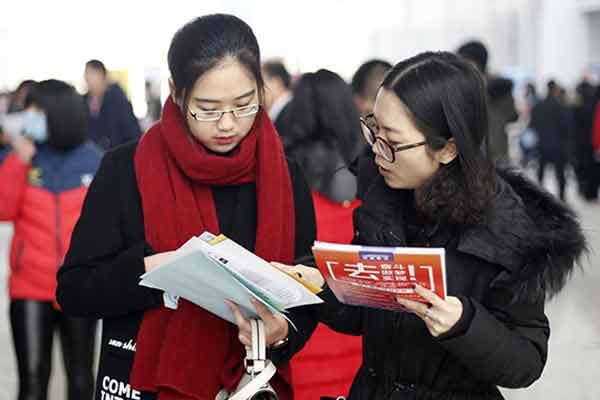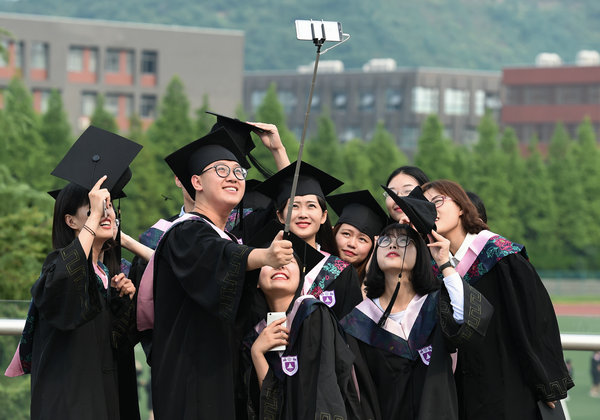
From the People's Daily app.
This is Story in the Story.
The number of China's universities and colleges reached 2,596 by the end of 2016, according to a report released by the Ministry of Education.
The report said 4.05 million students were admitted to undergraduate programs in 2016, making the country a higher education powerhouse.
The report also showed that 28.53 million people graduated with a bachelor's degree from 2005 to 2015. Among those with who obtained jobs in urban areas in 2015, those with bachelor's degrees accounted for 47.2 percent, 25 percentage points higher than 2005.
"Those with bachelor's degrees constitute the most important engine of the country's newly increased human resources who support the country's social development and economic drive," the report said.
About four out of five fresh Chinese higher education graduates said that they are willing to work, 6.39 percent more than the previous year, according to a recent employment survey report.
The report, published by leading hiring website Zhaopin.com, polled more than 90,000 recent university and college graduates.
China is expected to see about 8.2 million higher education graduates this year, 250,000 more than 2017, the report said.
Comparing to the old generation, more young graduates now decide to work after their graduation. As these fresh graduates emerge to the job market, the pressure of job competition also increased rapidly.
Today’s Story in the Story will look at how Chinese parents support the young college graduates to pursue dreams.

People attend a job fair in Hengshui, North China's Hebei province, Feb 13, 2017. (Photo: Xinhua)
Many parents of recent graduates support their search for the ideal job, saying there is now more scope for trial and error and that allows young people to pursue their dreams.
Huang Qiaoling, 50, said that when she was young, people also dreamed of trying different jobs in order to find the one that suited them best, but the concept of work back then was that everybody stuck to what they did, and job-hopping was a rarity.
"For the current young generation, we hope they can live a happier and more purposeful life, given their families have poured resources into their education since childhood," said Huang, from Changsha, Hunan province, whose son was born in 1992.
"Moreover, the stronger financial support from parents gives the young generation nowadays the privilege of not just making a living but finding their real interests."
Huang's son Xia Yuxuan graduated from the University of Science and Technology of China in Hefei, Anhui province, in 2014 with a bachelor's degree in geophysics, and took three jobs in Beijing: one at a State-owned enterprise, one at a technology firm at Zhongguancun Science Park, and the other at a startup producing smartphone applications. After two years, he opted to go to the United States to study quantitative financial engineering.
"We are delighted and proud that he left each job position with a complete piece of work," Huang said. "Through such a process, he was able to become clearer about what he really wanted and approach his goal."

Nanjing University students take group photos after their graduation ceremony. (Photo: Xinhua)
Ke Da, whose daughter was born in Shanghai in 1991, said young people are also more likely to job-hop frequently because there is a wider variety of enticing employment opportunities.
"Government departments and State-owned enterprises, which were undoubtedly the first option for job seekers of our generation, are no longer the best options for some people today," he said. "Foreign companies and private startups are chased by some young job seekers for various reasons."
Ke, in his mid-50s, works as a research and development technician in a company that produces communications equipment. He said some colleagues born since 1990 had left for other jobs after just half a year or even as little as three months.
"The situation is related to the economic environment," he said. "In the computer science industry, with its current, heated investment climate, it is common for young people to chase highly-paid jobs."
Ke said his daughter has worked as a journalist for one employer for five years.
"Actually, I'm supportive if my child wants to change her job one day as long as she has enthusiasm for it and the job has social value," he said.
Ke said he also reminds her to keep learning, so she can adjust to changes in the new era.
"The world is changing so rapidly, and we have no idea where it is going," he said. "We don't want our child to eventually become a restless job-hopper if she cannot survive in the competitive job market."
Some college teachers say some graduates job-hop due to a lack of perseverance and patience, which is a concern for their parents, but generally speaking, frequent job-hopping by the young is a declaration of their values: They would rather choose a path of self-realization than do what others view as appropriate.
Yan Yining, deputy dean of the School of Journalism and Communication at Shanghai International Studies University, said the way students performed in class and school activities showed they were more focused on personal choices.
"Students, from the beginning of the junior year, have diversified plans and schedules for their selective courses, internships, and preparations for employment or future studies, which is very different from what we used to do as students, which was following the unified arrangements of the school," said Yan, who began working as a university teacher in 1998.
She said showing respect to young people's personal choices is a form of social progress.
"Whatever decision they make for themselves, I believe it'll be a good one if they make it with responsibility and think it is in line with their long-term goal," she said.
(Produced by Nancy Yan Xu, Terry Guanlin Li, Lance Crayon and Raymond Mendoza. Music by: bensound.com. Text from Global Times and People’s Daily.)


